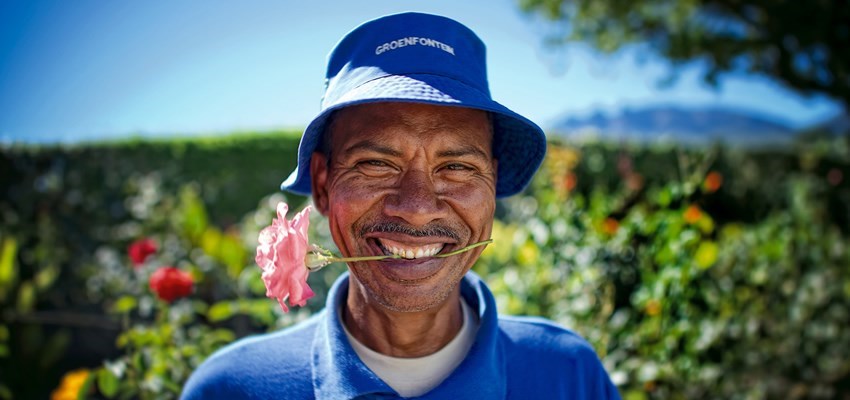
At Bosman Adama we believe that our natural environment is integral to the sustainability of our community, and that the responsibility for proactive care and conservation rests with each one of us.
A heritage of sustainability
Bosman Adama has three areas of focus: heritage, sustainability, and innovation. Our community has lived and thrived on this farm for eight generations, which means we have a heritage of sustainability. But we also have a responsibility to future generations, and that’s where innovation comes in. We are constantly looking at new ways to make our farm sustainable. The land and the people on it are inextricably linked and rely on each other to survive, yet to thrive, we need to regenerate. We need to find new ways of conserving what we have, but also to progress and improve on all fronts. That is our passion.
Bosman Wellington
On the Wellington farm several initiatives are taking place.
Over the last 5 years, 20 hectares of vineyards have become organically certified, with another 30 hectares that are currently in conversion that will come on board over the next few vintages. Healthier grapes and the decreased use of pesticides means the wine in the glass is so much better quality. Winemaker Corlea Fourie likes to say: “Don’t drink more wine, just drink better wine.”
Other environmentally conscious initiatives on our Wellington farm are:
- 300 sheep graze between the vineyards in the winter months keeping the cover crops in check and spreading beneficial micro-organisms through their waste. No nasty herbicides needed.
- We are starting to see results from our compost tea plant. We brew a ‘tea’ of micro-organism which replace chemical fertilisers which are harmful to the environment and require excessive water to distribute.
- Our grafted vine cuttings are planted out in fields which lie fallow most of the time. In the interim periods we now plant these fields with teff, an ancient grain from Ethiopia. These plants need little water, regenerate the soil with much needed nutrients, produce several crops per year, and once harvested, are baled, and sold to stud farms as apparently teff is really nutritious for horses.
- The rehabilitation of the open land surrounding our vineyards is an ongoing project. We are constantly removing aliens, assisted by our army of goats who munch anything that dares resprout, creating conditions where indigenous ‘fynbos’ will flourish. These plants in turn attract indigenous birds, insects and other wildlife, but also consume significantly less water which means there is more available to the vines. The entire ecosystem then begins to look after itself, requiring minimal intervention from humans and synthetic chemicals.
- Sunlight is abundant in the Bovlei, and so every available roof surface is covered in solar panels saving a considerable amount of electricity.
- We also specifically grow grapes that thrive in our warm, dry climate, so no need to irrigate excessively.
- We have stopped using Glyphosate (Roundup) in our vineyards for more than a year. This improves the health of our soil, which in turn improves the quality of the grapes that arrive in the cellar. Healthy grapes require less sulphur, a direct benefit to the wine consumer.
- The benefit of living in a steep valley is that we can irrigate our vineyards by gravity, not electricity, via a pipeline placed at the top of the farm in the Kromme River.
- We have invested in testing a drone to spray our higher lying vineyards which are hard to reach by tractor, and additional rootstock fields, an area of almost 150ha. We could potentially save 4500 litres of diesel per year but also spare the soil from the erosion created by the tractors and reduce noise pollution.
- All the lights in the cellar and tasting rooms have been replaced with LEDs to save electricity and CO2.

Bosman Hermanus
We are also very proud that the Upper Hemel-en-Aarde farm, Bosman Hermanus, was recently awarded BWI (Biodiversity and Wine Initiative) Champion Status underwritten by WWF South Africa. As a WWF SA Conservation Champion, they commit to biodiversity-friendly farming practices, conservation of their natural areas, and continually improving their water and energy efficiencies.
Initiatives there include the clearing of aliens from the natural areas, including a pristine wetland, to allow the natural fauna and flora to thrive. To date over 290 indigenous ‘fynbos’ species have been identified on the farm and we are propagating these plants endemic to the area, to spur on rehabilitation.
Within the vineyards themselves, the team plants cover crops in between the rows and roll them flat in spring to feed the soil and create mulch. The water-hungry alien trees on the farm have all been cut down and chipped to serve as mulch on the ridges of the vine rows.
The tasting room is also focusing on sustainability. Coffee is sold in bamboo cups while farm workers earn extra cash by turning used wine bottles into drinking glasses. We also grow certain fynbos species commercially and the workers and make up bunches of the leftovers to sell. These are called ‘plaasmeisiebossies’ and have become very popular amongst visitors to the farm.
Our community is very aware of the need to conserve and regenerate. Joint ownership of the farm means we all have a vested interest in the sustainability of our environment. It’s a dedicated team effort because we’re all in this together!